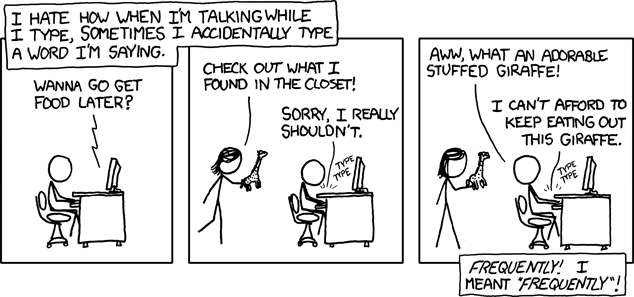Cross-modal interference
« previous post | next post »
The xkcd cartoon calls it "qwertial aphasia", but aphasia isn't quite the right term. The phenomenon is by no means unknown, however.
By the way, qwertial is a cute derivative from QWERTY.
(Hat tip to John Riemann Soong.)
[Addenda 7/22/09: I now realize that qwertial is also not really appropriate; the intrusive elements aren't single letters, but whole expressions.
Next, a message from Bruce Rusk:
Your post on LL today says of the accidental inclusion of spoken words in writing that “The phenomenon is by no means unknown, however.” Certainly true: a parable recounted by the 3rd-century BCE Chinese thinker Han Fei tells of a man who was writing at night and told the servant holding the light to “raise the lamp.” As he did so he accidentally inserted the words “raise the lamp” into his letter, setting off a chain of events of which Han Fei makes a great deal. So the phenomenon has probably been around as long as writing (or at least easy writing with pen or brush).
Finally, a note on aphasia. Sometimes when I cite ordinary-life examples of glitches of one kind or another, people identify them as aphasic, explaining that they're just the sort of thing you hear (or read) from aphasics. This is true, but in an important sense it has the relationship backwards. There are all sorts of everyday speech errors, and they aren't symptoms of pathology. Instead, in aphasias and other language pathologies, errors occur much more frequently and in greater profusion (making speech and writing often very hard to understand) — but with rare exceptions, the errors in language pathologies are of the same sort as everyday errors.]
